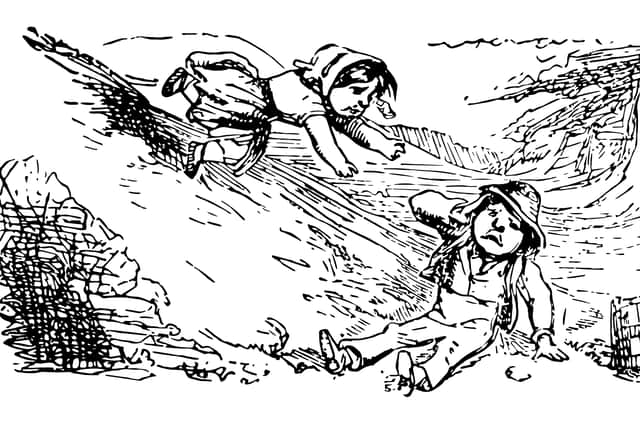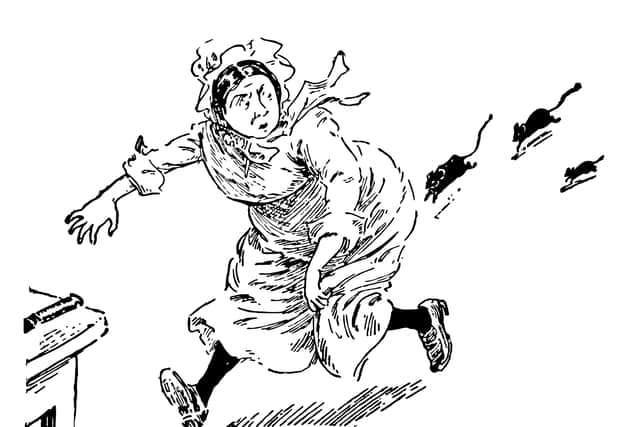From Humpty Dumpty to The Wheels on the Bus: 15 children’s nursery rhymes and what they could really mean
and live on Freeview channel 276
Nursery rhymes have been a part of people’s childhoods for generations. People hear them from their parents and grandparents and then, in turn, when they grow up and start families of their own they sing them to their children and grandchildren.
They become an important part of our childhood memories, as we tend to associate them with beloved family members who sang them to us. But, have we ever really stopped to think about the words of these rhymes that have become so ingrained in family life?
Advertisement
Hide AdAdvertisement
Hide AdThere are many rhymes which have innocent meanings on the surface, but if we delve a little deeper there are many that have secret meanings that aren’t innocent at all. In fact, they are negative, controversial or even downright frightening.
Read on to find out the hidden meanings behind 15 classic children’s nursery rhymes, and please be warned that these descriptions are not suitable for little ones.


Humpty Dumpty
As the rhyme goes, humpty dumpty said on a wall, had a fall and he couldn’t be put back together again. The rhyme is thought to date back to the 17th century and could have links to times of war. This seems highly likely considering the rhyme also mentions “all the king’s horses and all the king’s men” - but all of the soldiers who fell during the war were fatally injured. We all also seem to have accepted that the character of humpty dumpty is an egg, and in depictions of the tale he is often drawn as such. There’s no real reason for this, that anyone knows, and that’s not confirmed within the rhyme. Perhaps it’s just more palatable to us that an egg got broken and not a person.
This Old Man
The nursery rhyme is often used by parents to help their children learn to count and also learn about rhyming words, as the verses go up from one to ten to describe all the things that the old man does. For example, “this old man, he played eight,
Advertisement
Hide AdAdvertisement
Hide AdHe played knick-knack on my gate”. One perfectly harmless take on this rhyme is that it’s describing a sweet old gentleman - but there’s another sinister take which suggests it may have been used as a warning to stop children speaking to older men who were a bit creepy.
Pop Goes the Weasel
This catchy nursery rhyme has several verses which all end with the words “pop goes the weasel”. On face value, it’s about an actual weasel who keeps popping its head in and out of the ground. There are some who think, however, that it was written to talk about - and perhaps even celebrate - poverty. This could be because one line states “up and down the London road, in and out of the Eagle, that’s the way the money goes.”


Rock-a-bye Baby
This nursery rhyme is one of those that we all sing without really thinking about what it is we are actually singing about. Even on face value, this one’s not very nice. It talks of a baby being in a cradle at the top of a tree, then a wind coming and blowing the cradle - and the baby - out of the tree. There’s no more lines, but one can imagine that a baby would be hurt after such a great fall. One theory about a deeper meaning is that it’s about a couple who let their baby sleep in a hollowed out tree.
Eeny meeny miny mo
This is a rhyme often used when youngsters are playing games with their friends to decide who’s turn it is for a game. Each syllable counts for one child, and whichever child gets the ‘mo’ syllable is the one to be picked. “Eeny, meeny, miny, mo” are all made up words of course, but there are some words in there that could be troublesome. There’s the lines “eeny, meeny, miny, moe, catch a tiger by the toe, if he hollers let him go.” Even on face value this may not be very nice as it suggests an animal could be caught against their well and have some pain caused. There is also some suggestion that the word tiger has been substituted over the years as the original word used was racist.
Rub a dub dub
Advertisement
Hide AdAdvertisement
Hide AdThis nursery rhyme dates back to the 18th century and appears to be simply about people taking a bath, a butcher, a baker, a candlestick maker and a maid. According to The Oxford Dictionary of Nursery Rhymes (1951), however, the lyrics are illustrating a scene of three reputable men watching the maid in a less than decent moment.


Jack and Jill
The story about Jack and Jill, who people have always assumed are siblings or friends, tells the seemingly innocent tale of how they went to fetch a pail of water - and then went tumbling down a hill when they couldn’t do it. Jack fell and cracked his head, which is bad enough - but there’s one theory that states Jack and Jill were secret lovers and, though the rhyme goes on to say Jack got up and went home after the fall, he then later died from his injuries and Jill was heartbroken by the loss of her love.
Ring around the Rosie
Another rhyme that has two versions, whether they’re ringing around the rose or ringing around the rosie, but it all seems to point to the same meaning. The rhyme speaks of tissues and people falling down, which is referring to people dying due to illness. Since the mid-20th century, people have said the song is about the plague that took hold in England in 1665.
Three Blind Mice
The tale of the three blind mice dates back to 1609 and the date of the rhyme is the first clue that it isn’t actually about three mice who are blind at all - although that meaning is distressing enough as it is. It is said to refer back to Queen Mary I, and the blind mice were the Protestant loyalists who were accused of plotting against her. These three men were apparently burned at the stake, and that’s even more distressing. Also, remember one of the lyrics is “she cut off their tails with a carving knife” - not a great thing to sing to kids.


Old Mother Hubbard
Advertisement
Hide AdAdvertisement
Hide AdOld Mother Hubbard is a strange rhyme anyway, and one that is sure to confuse children before you’ve even started to analyse it. At face value it seems to be about a mum who has a dog, which then dies because she had nothing to feed it. Again, this is a very upsetting thing to say to children. Then, however, she tries to sort out a funeral for him and returns home to find him alive and laughing. She then discovers that he can actually read and write. It’s all very strange. Some believe that Old Mother Hubbard was never a mother, and wasn’t even a woman either. Some say it’s a rhyme used to poke fun at Cardinal Thomas Wolsey, who refused to give England’s King Henry VIII an annulment in the 16th century.
Goosey, Goosey, Gander
This rhyme seems silly, a bit far fetched and ultimately just fun, but the meaning behind it is way darker than anyone would have thought. Its meaning points to religious persecution in England, where Catholic priests weren’t allowed to say their prayers in Latin anywhere, even when by themselves. Think of the lyric “there I met an old man, who wouldn’t say his prayers”. But, there’s also the problematic line of “so I took him by his left leg, and threw him down the stair”.
London Bridge Is Falling Down
London Bridge is another classic rhyme. It’s very repetitive, telling us time and time again that London bridge is falling down, and also frequently mentions “my hair lady” at the end of every verse. My fair lady doesn’t seem to have any relevance, but that might have been a clue that the nursery rhyme isn’t what it first appears. Even on surface level, it’s about a bridge crumbling, which isn’t good, but there are people who say it’s derived from a real-life Viking attack in the early 1000s.
Mary, Mary, Quite Contrary
The first time you hear this nursery rhyme it sounds very innocent, it is simply gardening advice about how gardens grow and the need for silver bells to help them to grow somehow. However, it’s actually about murder. Again, it refers to Queen Mary I, who also has the nickname of Bloody Mary, and talks about cockle shells and silver bells as torture devices.
Baa Baa Black Sheep
Advertisement
Hide AdAdvertisement
Hide AdBaa Baa Black Sheep appears to be simply about the buying and selling of wool, and seems perfectly innocent. It is actually about the mediaeval wool tax, imposed in the 13th Century by King Edward I. Under the new rules, a third of the cost of a sack of wool went to him, another went to the church and the last to the farmer. Think of the line which refers to nothing being left for the little shepherd boy who lives down the lane. Black sheep were also considered bad luck because it could not be dyed and was therefore less lucrative for the farmer.
The Wheels on the Bus
The original song mentions the wheels on the bus, followed by the wipers on the bus going swish, the horn on the bus going beep, and the people on the bus going up and down. Other verses added over the years include the doors opening and shutting, the driver going “move on back,” the baby going “wah,” and the parents/mommies on the bus going “shh.” It’s all very repetitive which helps with the sing-song nature and that helps children to remember. There’s no obvious second meaning here, but that doesn’t stop some accusing it of being secretly anti-capitalist, anti-religious, or anti-industrialist.
Comment Guidelines
National World encourages reader discussion on our stories. User feedback, insights and back-and-forth exchanges add a rich layer of context to reporting. Please review our Community Guidelines before commenting.
